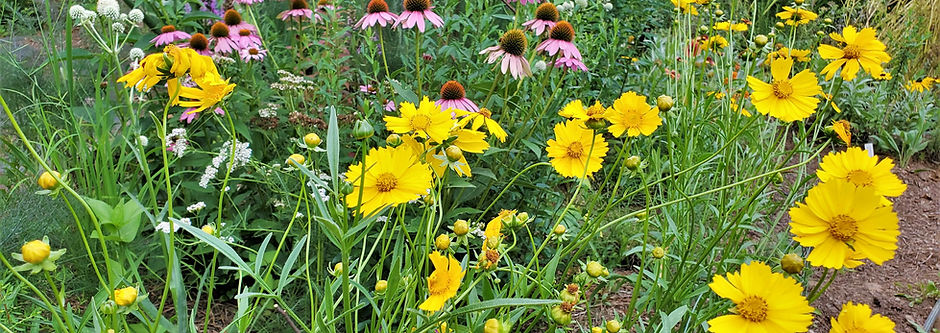A Habitat Yard Workshop Offers Actionable Change
- ljmarkson

- Feb 8, 2024
- 3 min read
Updated: Feb 13, 2024
Last fall I hosted three free habitat yard workshops. My goal was to share actionable ways create a more ecologically sustainably landscape with the focus on the function of our yards as a wildlife habitat. (Video snippet of me explaining how the future includes ecological landscaping)
The workshops were small and filled up quickly with folks from all over Atlanta looking for hands-on, practical ideas with an insight into how basic habitat elements might be added to a yard.

I learned from workshop attendees that there is a commonality of challenges most folks in Atlanta experience on their journey of creating a healthier landscape. Top issues involve removing invasives such as nandina and English ivy that were once planted as “easy-care” landscape plants, and sourcing hardy native groundcovers to plant once invasives or non-native lawn grass has been removed.

Most folks who attend the habitat workshops agreed finding resources can also be confusing because the gardening world is still geared towards ornamental, not ecological landscaping. In the workshops I explain the basic differences and commonalities between the two. I also share what I’ve learned including why and how to source native plants; how to find eco-friendly landscapers, yard services, and even businesses that remove invasive by hand instead of hiring the old school scorched earth landscrapers; and where to find more information from classes, books, organizations, experts, and leaders who are changing the conversation. What’s great about a small group workshop like this is many of the participants also have knowledge and resources to share.

I’ve just scheduled a free winter habitat yard workshop for Sunday, February 25 from 12:00-2:00 to build on the idea of offering seasonal workshops with the same basic information showcasing the dynamic nature of a living landscape. I should probably call it a shoulder season habitat yard workshop since it's during the transition from the dormancy of winter to the main growing season of spring but the term is not yet common. The habitat elements are the same each season, but the focus will change slightly. In the fall seed collecting, leaving the leaves, and letting stems and stalks stay are obvious talking points. In the winter native seeds and berries for winter birds, life under the leaves, and the habitat value of dried stems and stalks standout.

My goal is to offer help, information, and a yard filled with ideas geared towards anyone who is beginning the process of creating an ecological oasis in their own yard. I’m encouraged when I meet homeowners who are transforming their yards and sharing what they know with their neighbors; parents in the crazy 24/7 parenting years who are making a healthy landscape a priority and modeling a love for nature for their children; parents who are bonding with adult kids around habitat yards; or folks who aren’t gardeners but are learning as much as they can to help our world starting right outside their front door.

I’m maintaining the low-key nature of the workshops by reaching out through my networks to folks who are open to change - feel free to share this post with anyone you think fits this description. Before reserving a spot by e-mailing ljmarkson@att.net, please read the blog post I wrote last fall HERE explaining the reasons for the workshop and what to expect. The dates for spring and summer workshops are in the works. (Shari sums up the imperative to restore habitat in our yards perfectly - "this needs to change")
Note: There are no affiliate links in this blog. Please click the highlighted text throughout the post for links to references, details, explanations, worthy organizations or businesses, or examples that I think might be helpful.


.jpg)
